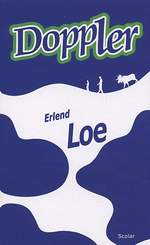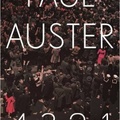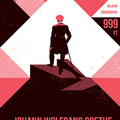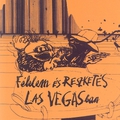Erlend Loe: Doppler

A few years back I used to see this novel quite often in the bookstores, but its oft-criticized cover baffled me and I had never felt the slightest inclination to read the book. Then a couple of weeks ago I came across a review of Doppler peppered with some quotations from the text, and I realized that Loe’s book is something I might be interested in. I got hold of the novel soon after and quickly read it, and it soon turned out that Doppler is everything I expected and even more than that.
The anti-hero of the novel is Andreas Doppler, middle-class husband and father of two children, who lives an uneventful, normal middle-class life. Then one day, after a bicycle accident he decides to suspend his boring life for a while and move to the forest surrounding Oslo, in order to stop being a smartass, avoid communication with people and to bring the art of idleness to perfection. However, his solitude is not unperturbed: Doppler finds himself in the company of the young moose, Bongo, the scale-modeling Düsseldorf, the bourgeois Bosse who is busy organizing a peace festival in the forest, his cartoon-junkie son, Gregus, and the burglar Roger who was just thrown out by his girl-friend, and finally Doppler leaves his tent to search for a quieter place, as the forest has become too crowded for his taste.
The novel abounds in extremely funny episodes: for instance we can witness how Doppler goes about killing a moose then uses the meat to trade it in for his daily liter of low-fat milk; we see Doppler in his house, jovially chatting and drinking away with the burglar who is just about to steal his belongings; and we can also see how Doppler erects a monument in order to commemorate his late father. And apart from the sheer grotesquery of the events, we also read hilariously amusing and self-ironic meditations on the bad effects of TV, the ubiquity of popular culture or the harmful consequences of being a wise-guy.
Judging from the beginning and the general topic of the novel, Doppler could easily be a moralizing, gloomy and cynically told story which wants to hammer in a lot of serious truths. Fortunately, Doppler is everything but this. Rather, it is an outstandingly entertaining read. I hardly ever laugh out loud while reading, but I giggled through Doppler from the beginning to the end. As Kurt Vonnegut says in one of his novels the title of which escapes me now, we are on this earth in order to horse around, and I believe Doppler is the perfect example of fooling around becoming a lifestyle.
Of course Doppler also contains a lot of social criticism, talks about the emptiness of human relationships and refers to the dark historical background of some of the characters, however, I never felt it to be a distressing work, thanks to the style and self-irony of its anti-hero. Doppler does not take himself seriously for a minute and does not pretend to be the only person in the world who knows the road to wisdom and salvation. On the contrary, he frankly admits that he cannot and does not want to be anyone’s spiritual guide, since his own move to the forest was only due to a lucky coincidence, too.
Doppler does not want to convert anybody to his lifestyle, on the contrary, he would prefer if everybody stayed at home or stack to the beaten tracks in the forest, and let him carve his monument for his father, play memory games with Bongo or simply do nothing. To preserve his quite way of life, Doppler can even become violent or start to casually threaten other people with violence. So it seems that despite the apparent similarity, Doppler is not quite a mild, Thoreau-like figure camping out at Walden Pond and peacefully contemplating the beauty of forest animals or bean-cultivation, and in the meantime showing the wonders of simple life and the possibilities lying in passive resistance to the others. Instead, Doppler is the cynical, witty product of modern life who would like to get out of the grasps of civilization, but is only able to do this partially and for a short while, as civilization follows him to the forest (e.g. he cannot get rid of the tune of Bananas in Pajamas, stuck in his mind) and he cannot cut himself loose from it either, as he is dependent on some of its products, such as low-fat milk.
It is of course possible to interpret Doppler’s failure to create an alternative life in the forest as something tragic, and it is also possible to think that it really must be an awful world where individual values and efforts are doomed to failure, as no-one can get out of civilization completely, however, Doppler is much too ironic and entertaining a novel and I do not think it should be spoilt by too much moralizing and gloomy thoughts. As I already mentioned, Doppler does not take himself seriously, so I believe the reader should not take him too seriously or consider him an example to follow either. This is a very amusing novel, so the best you can do is to be amused by it. It is worth it.





